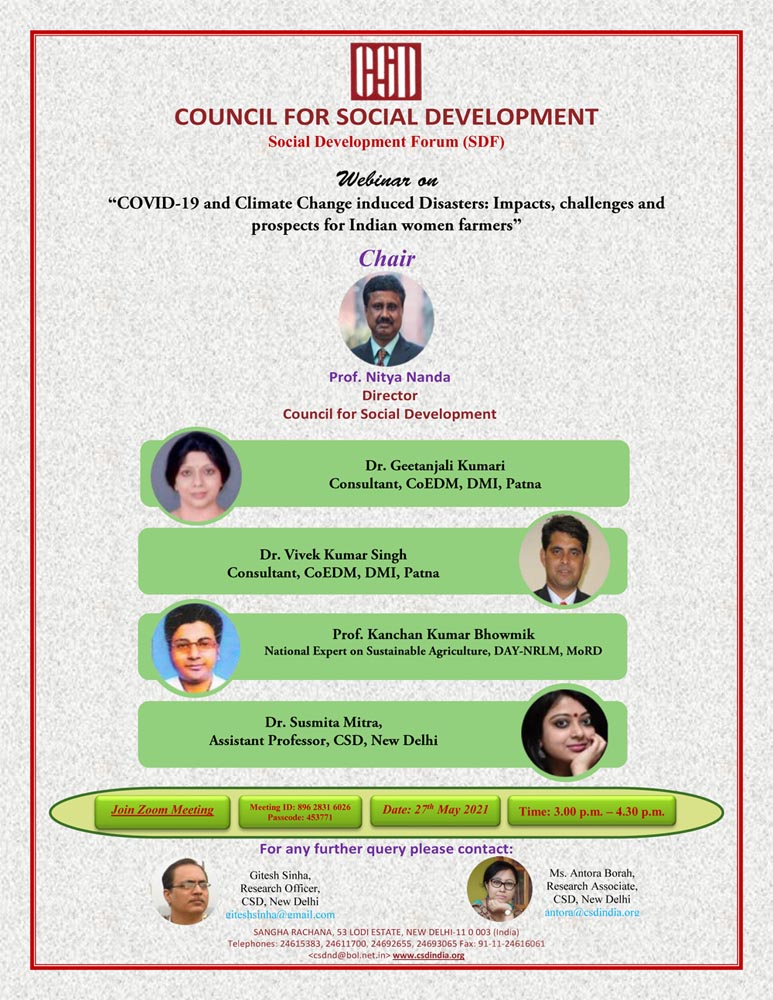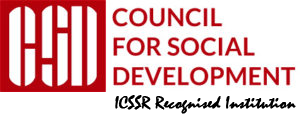COVID-19 and Climate Change induced Disasters: Impacts, challenges and prospects for Indian women farmers

Proceedings of SDF Webinar on 27th May, 2021
The Council for Social Development (CSD), New Delhi, organized a webinar on COVID-19 and Climate Change induced Disasters: Impacts, challenges and prospects for Indian women farmers on 27th May 2021 as a part of Social Development Forum (SDF) Discussion. Over 30 participants including more than 10 experts on climate change and allied areas from across India participated in the event. The deliberations mainly focussed on multi-layered impacts of COVID 19 and climate change induced disasters on women farmers of India.
The panel discussion was chaired by Prof. Nitya Nanda, Director, CSD, whereas the panellists included – Dr. Vivek Kumar Singh, Consultant, Centre of Excellence in Disaster Management (CoEDM) at the Development Management Institute (DMI), Patna; Dr. Geetanjali Kumari, Consultant, CoEDM, DMI, Patna; Prof. Kanchan Kumar Bhowmik, National Expert on Sustainable Agriculture, Deendayal Antyodaya Yojana – National Rural Livelihoods Mission (DAY-NRLM), The Ministry of Rural Development (MORD), Government of India (GOI); and Dr. Susmita Mitra, Assistant Professor, CSD. The key points highlighted in the webinar have been presented under the following sub themes:
Climate change vulnerability of women farmers in India
- According to the 5th IPCC Report South Asia is the most venerable region in terms of climate impacts in the world. The nature of disasters can be categorised as natural, biological, technological and societal disasters. Climate change has either direct or indirect impact on natural and biological disasters.
- Indian agriculture is highly dependent on irrigation and for irrigation we either need river flow or ground-water. But, climate change has heavily impacted our natural water resources which indirectly impacts the agricultural sectors of India.
- The worst sufferers of climate change are marginal and small farmers who lack social and financial capital. Women farmers are heavily impacted by climate change in various ways, due to lack of capital for adaptation and other social constraints. In India, around 85% farmers are either small or marginal and in rural areas, 73% women workforce is engaged in agriculture sector. Many empirical studies highlight that woman are among the vulnerable communities and only 13% women have own land for farming. Primary data from 1200 women farmers from eastern Uttar Pradesh show that adaptation practices for rainfall changes are higher compared to that of the temperature increase. Increasing cost of farming and poverty are the major constraints in adaptation, whereas lack of support during pregnancy and lack of non-farm opportunities are the major challenges faced as women farmers.
The added problem of COVID-19
- The current COVID-19 pandemic has increased the vulnerability context of the Indian agriculture sector. COVID-19 has serious impact on entire value chain of the agricultural system in India. The backward and forward linkages of farming activities have been seriously impacted due to nationwide lockdown. The agricultural inputs availability, farming activities, aggregation, storage and logistics, processing and ancillary services and consumer demands have all been negatively impacted the production and productivity which lead towards livelihood, food and nutrition insecurity among the smallholder farmers and particularly among women farmers.
- COVID-19 had a significant impact on gender inequality as well. Many families have lost their sole bread earners due to COVID-19 and entire economic as well as social responsibility of the families shifted to the women. Furthermore, the domestic violence has increased due to losses of livelihood and male members are mostly staying at home due to lockdown. With COVID-19, unpaid care work has increased for women, with children out-of-school, heightened care needs of older persons and overwhelmed health services.
- The COVID-19 pandemic has magnified the accessibility of basic health need. Health wise, already there are various challenges of woman in different phases of life: adolescent girls suffer from anaemia and calcium deficiency, adolescent pregnancy; during pregnancy most of the women do not get adequate health care services and COVID-19 worsened the situation. Routine vaccination and other health care services also affected during pandemic and proper nutritional need of lactating women are not catered properly during the pandemic. The women are also engaged in daily household chores and cooking even during they are COVID positive.
Suggested solutions
- In the light of the present problems, interventions are required after understanding the causes and consequences of COVID-19 on women smallholder farmers. There is a need to identify the vulnerability context, asset portfolio, institutions, policies and process access and influence, livelihood strategies and livelihood outcomes. The situation analysis and response analysis can pave the way for response planning and implementation. The present situation calls for implementing three phases of women centric plan – building understanding and evidence, designing the action plan, and preparing for implementation. In order to address some of these complex issues, multi-stakeholders approach at community level should be planned. To tackle the post pandemic mental and psychological health of women and other vulnerable communities, government must start psychological counselling centres at the Panchayat level.
- Sustainable / organic agriculture is the way out of this problem. If we can assure our day-to-day meal of each time to be poison-free, all problems i.e. soil health, environmental health, water health, social family bonding, climate change, natural calamity, animal-human health hazards etc. will be solved automatically. Women Federation may play a vital role to combat this challenge through Mahila Kisan Sashaktikaran Pariyojana (MKSP) which is a sub component of the National Rural Livelihood Mission (NRLM) announced by Government of India.
- There are various government provisions for the farmers at the national, state and district levels. However, most of the policies do not focus on the need of the women farmers particularly. NGOs can play a major role regarding awareness building and grass root level implementation of these policies.
- The scope of Community Based disaster Risk Reduction (CBDRR) for sustainable development can be expanding by including everyone in the community. We need to keep the goal of resilient woman and family at the core and follow a multi stakeholder approach to achieve a 360-degree impact. Mapping of local resources, engagement of local governance are crucial to reach out our target population. The utilization of local governance/ structured platforms of health workers, self-help groups, local governance, multimedia and counsellors of COVID-care centres can be useful.
